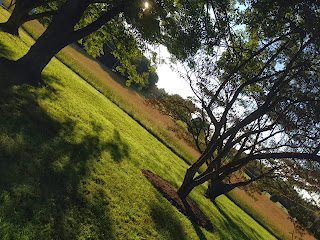I left the tuna salad on the counter uncovered, expecting the knock at my back door to be James or Mike—something incidental, something brief. Through the nine panes, however, I was greeted by another neighbor: the woman who lives in the dilapidated trailer on the hill above me to the east. Her apologies began as soon as I opened the door. “I don’t know if you remember me,” she said.
This was only our second meeting. Our first had been at the front door, later in the evening. Maybe it was the rain, which had fallen steadily since early that morning, but she seemed to be washed in the same gray as our first meeting, wearied somehow by the onset of night.
Of course I recognized her, I told her.
“I’m sorry to bother you…” she went on, “but I heard you were interested once in buying that trailer I live in.”
I had been interested. The land the trailer sat on was originally part of my property. I had already lost it twice to higher bids. The trailer, now, was really more than I had time to deal with. I certainly didn’t have the money.
“My mother past away at three o’clock today,” the woman told me, “and I need to sell that place to have her buried.”
Her frankness, I could see then, was an attempt to get the words out between waves of sorrow, and nothing I could have prepaired for when I left the tuna salad on the counter, uncovered.
She went on, breaking down at times.
In truth, she wanted to be away from the place, rid of it. Her mother had died in the living room. She couldn’t live there anymore. She would take whatever I offered. As long as it was enough to bury her mother and move on. She trusted me to be fair. I was a good man, she said. She could see that by how I kept my place.
I wept when I closed the door. I had never been in such need, until then, in the greyness of our second meeting.

































